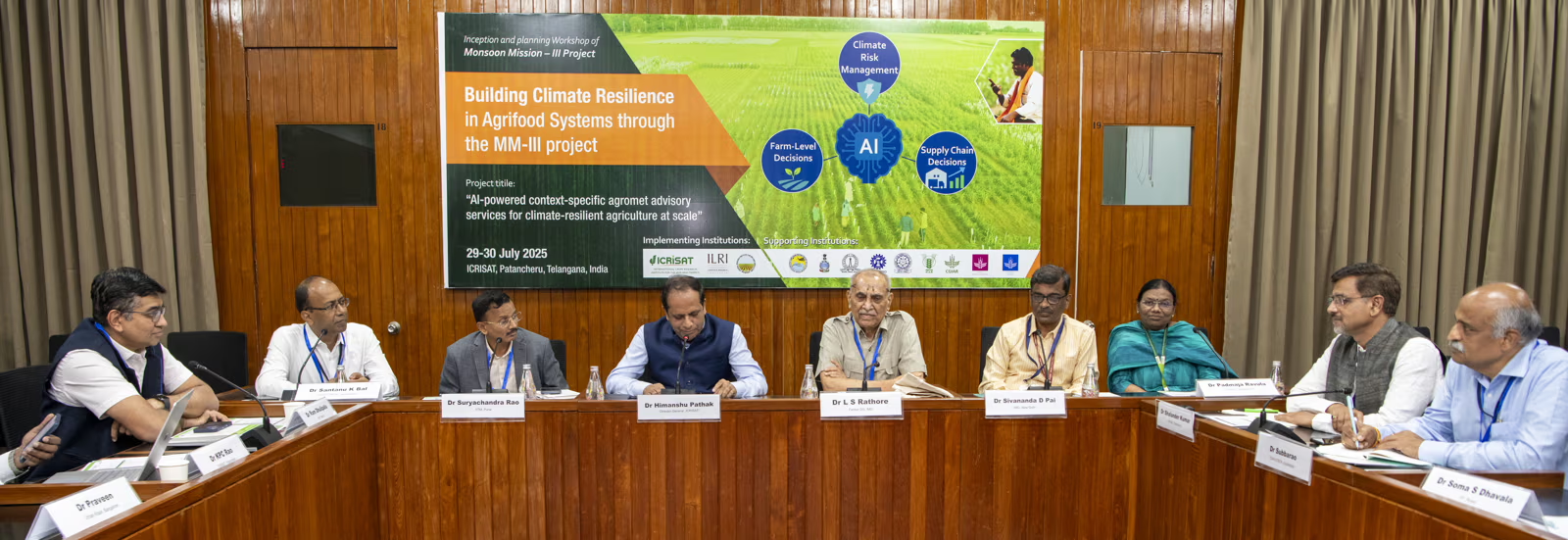Saturday, 21 February 2026

In a move poised to redefine the interface between climate science and farmer resilience, the International Crops Research Institute for the Semi-Arid Tropics (ICRISAT) has joined forces with premier national and global institutions to launch an AI-powered initiative aimed at delivering hyper-local, real-time climate advisories to smallholder farmers.
Titled ‘AI-powered Context-Specific Agromet Advisory Services for Climate-Resilient Agriculture at Scale’, the initiative is supported under the Government of India’s Monsoon Mission III. It brings together the power of artificial intelligence (AI), machine learning (ML), and mobile-first delivery systems to help farmers navigate increasingly erratic weather conditions with timely, personalized insights on sowing, irrigation, pest control, and other key farm decisions.
At the center of this initiative is the Intelligent Systems Advisory Tool (iSAT), a digital platform originally piloted under Monsoon Mission II. Now being significantly upgraded, iSAT will ingest real-time weather data, crop models, and satellite analytics to generate farmer-specific advisories. These will be delivered via intuitive digital channels, including an AI-powered WhatsApp bot, ensuring accessibility even in remote areas with limited bandwidth or digital literacy.
Launching the initiative at a two-day inception workshop held at ICRISAT’s Hyderabad campus, Director General Dr Himanshu Pathak emphasized the broader implications of the project, stating that technology developed in India can serve as a scalable model across the Global South. As smallholder farmers face growing climate risks, innovations like this offer them agency, foresight, and resilience. Speaking virtually from Nigeria, Dr Victor Afari-Sefa, ICRISAT’s Research Program Director for Enabling Systems Transformation, echoed this vision of South-South knowledge transfer.
The project’s first phase will be implemented in Maharashtra, where ICAR’s Agro-Meteorological Field Units (AMFUs) will help operationalize the model at the grassroots. Insights from this rollout will inform a national blueprint and position the platform as a foundational layer for the Government of India’s upcoming climate-tech initiative, MausamGPT.
Dr Suryachandra Rao, Director of the Indian Institute of Tropical Meteorology (IITM), noted that MausamGPT aims to integrate AI, meteorological forecasts, agronomic models, and large language frameworks into a seamless, interactive service for farmers. Dr Shivananda Pai, who heads the Agromet Division at the India Meteorological Department (IMD), stressed that democratizing access to climate intelligence is key, especially for farmers who need the ability to pull information on demand rather than wait for traditional advisories.
This flagship initiative is the result of a high-level collaboration involving ICRISAT, the Indian Council of Agricultural Research (ICAR) – CRIDA, the International Livestock Research Institute (ILRI), IITM, IMD, the Center of Excellence in AI for Agriculture at IIT Ropar, CSIR–Central Scientific Instruments Organisation (CSIO), and the Indian Institute of Science (IISc).
According to Dr Ram Dhulipala, Director of CGIAR’s Digital Transformation Accelerator, this project exemplifies how mission-driven digital innovation can accelerate systemic impact in agriculture. Dr Shalander Kumar, Deputy Global Research Program Director at ICRISAT, noted that the initiative offers a rare convergence of research excellence, policy backing, and farmer-centric design—making it uniquely positioned for scale and long-term sustainability.
As global agricultural systems reel from the twin pressures of climate volatility and food insecurity, this initiative reflects a broader shift toward intelligence-driven farming. It demonstrates how cutting-edge technologies, when rooted in collaborative science and grassroots delivery, can empower the very communities most vulnerable to climate change.
This work is aligned with the UN Sustainable Development Goals, particularly SDG 13 (Climate Action) and SDG 17 (Partnerships for the Goals). As AI meets agri-science, the future of farming in the Global South may not just be resilient—it may be radically reimagined.